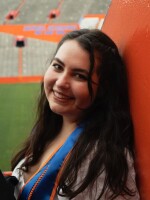Teigin Monson didn’t know what or where Key West was when he learned he would journey to the southernmost city for a week last summer. The 18-year-old is from a small island community off of one of the country’s most northernmost areas — Washington state. He was expecting somewhere tropical, where he could maybe snorkel with turtles.
What he walked away with, he told WLRN, was beyond expectation.
"The water is nothing like I've ever experienced before," he said. "This is the furthest I've ever been from home. And it's quite literally on the opposite side of the country from where I come from."
Monson was one of five high school seniors that visited Key West from other parts of the country through a program called the American Exchange Project (AEP).
The exchange’s goal is to connect young people in a divided country by sending AEP participants to places that are politically, socio-economically, and culturally different from the place they’ve grown up in.
The program, which is free to all participants, sends students to various places for a week filled with community events, cultural immersion, volunteer and professional development opportunities.
READ MORE: More than 150 years later, a Florida woman's account of life in early Key West is published
“I’ve seen AEP really become the good news,” said David McCullough III, the program’s CEO and co-founder. “The kind of apple pie idea that is pre-political and focused on young people that can also serve as a great splint to a fractured country.”
McCullough III is the grandson of Pulitzer-prize winning historian David McCullough.
This is the first year the program is running during a presidential election year, and it’s also the first time the program is working with a high school in the Florida Keys.
Four seniors at Key West High School participated this year, all of which were part of the Monroe County Education Foundation’s program. Take Stock provides Florida prepaid scholarships to Monroe County high school graduates coming from low-income households.
“Many of our students have never left Key West or never left the islands,” said Chuck Licis Mason, the Executive Director of the Monroe County Education Foundation, which oversees the Take Stock program.
The Key West High School participants went to places like Arvada, Colorado; Albany and Palo Alto, California and Portland, Maine. One local student even landed a two-month internship in Colorado after her visit there through AEP, according to Kimberly Rein, a Media Specialist for the Monroe County School District and AEP’s Key West exchange manager.
AEP is modeled after the foreign exchange programs that became popular peacekeeping tools after World War II. But this exchange is limited to domestic travel.
“I hope it makes (participants) feel like they too can connect with people who are different from them, and they too can find belonging in places that are very different from the places they'd ever thought they'd go in,” said McCullough III.
AEP participants that visited Key West did several things in just a week including volunteering at a beach cleanup, visiting the Ernest Hemingway house, touring a turtle hospital and spending a full day snorkeling off the Dry Tortugas.
The visiting students said they each came away from the week with a better understanding of Florida, each other and themselves.
“After this experience I realized that it’s OK to make life more social, away from your comfort zone,” said 18-year-old Lizette Tenorio-Fonseca from Paris, Texas.
Scott Warren, a visiting fellow at the SNF Agora Institute at Johns Hopkins said the kids were reflective of a wider trend he’s seeing among young people he teaches.
“I have seen a bigger appetite from young people in recent years to engage across difference,” Warren said. “I think that there is a sense of recognizing that the system is broken and oftentimes I think that there's media attention focused on some of the extremes, but you have a lot of young people that are interested in pluralism.”
Warren is the co-founder of a youth civics education organization and has been focused on educating young people about the American political system for about a decade.
He said one of the best ways to foster interest in civic participation starts in school.
“I think the best way to promote this honestly is an education system that values dialogue, debate, discussion as values and skills to be taught,” he said. “Schools touch the most amount of young people on an everyday basis.”
Monson, from Washington State, said this trip helped him foster a thrill to travel. Before this, he hadn’t visited anywhere south of Idaho. But after college, he hopes to become a traveling nurse.
Even though Key West is on the opposite side of the country from Vashon Island, Washington, Monson said it still reminds him of home.
“It's like the same island community,” he said. “Everything is always kind of intertwined and connected.”






